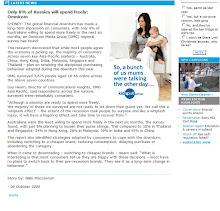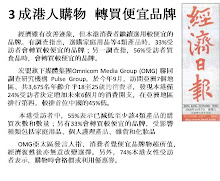We have thus identified the ‘Whiplash Effect’ – the extent of the recession took people by surprise and like a whiplash injury, it will have a lingering effect and take time to recover from.

CONSUMERS IN INDIA & CHINA MOST WILLING TO SPEND
China and India have suffered some slowing of their economies, but the overall impact has been less severe than in some Asian countries. It is probably not surprising then that consumers in both countries are most willing to loosen their purse strings. About 39% of consumers in India and 45% of consumers in China say they will spend more freely in the next six months, compared to 26% of consumers in Malaysia, 24% in Hong Kong, 18% in Thailand and Singapore and only 8% in Australia.
Countries: Singapore, Malaysia, Thailand, India, China, Hong Kong and Australia




